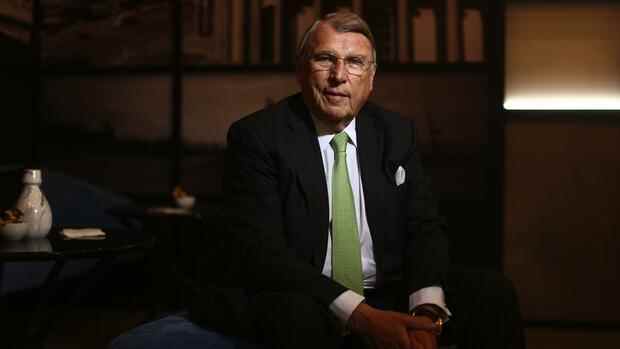Munich Hardly any other German manager has such close contacts to Russia as Klaus Mangold. From 2000 to 2010, the 78-year-old was head of the Eastern Committee of German Business and is still a member of the steering committee of the Petersberg Dialogue. In an interview with the Handelsblatt, he advocates a settlement with Russia in the Ukraine conflict. “It’s important that the thread of the conversation doesn’t break off,” says the chairman of the supervisory board of the supplier Knorr- Bremse.
Mangold does not expect a military clash to take place in Ukraine. “War or invasion harms Putin’s goals,” says the manager. The Russian President wants to stop NATO’s eastward expansion and a major conference on European security policy. “He won’t achieve those goals with an invasion.”
Mangold rejects sanctions against Russia. “The sanctions imposed after the annexation of Crimea tended to make Russia stronger,” he says. The Russian economy has learned to replace imports with locally produced goods. In addition, Europe is dependent on Russia for energy supply and must therefore hold on to the controversial Nord Stream 2 Baltic Sea pipeline.
Mangold is one of the most influential figures in the German economy over the past few decades. Among other things, he was a member of the board of directors of the car manufacturer Daimler and heads the supervisory board of the travel group Tui.
Top jobs of the day
Find the best jobs now and
be notified by email.
Read the full interview here
Mr Mangold, how do you assess the situation: will there be a war in the Ukraine in the next few days?
I don’t think there is war. War or invasion harms Putin’s goals. He wants to stop NATO’s eastward expansion and a major conference on European security policy. He does not achieve these goals with an invasion. The opposite would be the case.
What else speaks against an invasion?
The backing in Russia itself. There is not much acceptance of a big war in Russia either. That was different in 2014 when Crimea was annexed, for which Putin found great support among the population. Today he would have to reckon with criticism.
Nevertheless, soldiers continue to march. What does Putin want?
He believes that the West, and especially the United States, has not seen him as an equal in recent years. Russia has been excluded from the G8 round and, in its view, its proposals for a security architecture in Eastern Europe have not been heard. He wonders what will remain of his presidency and what he can still achieve now.
The West must now negotiate in the face of a military threat. How should the federal government react?
Only a solidarity between the USA, Germany, France and Poland will help. That happened. And determined diplomacy. It is important that the Europeans sit at the table on an equal footing, as in the so-called Normandy format, and represent their interests as equals. In order to constructively initiate a détente dialogue, it would be helpful if Russia reduced its military presence
More on the Ukraine conflict
One possibility would be sanctions that could hit Russia’s economy hard.
Sanctions don’t help, they don’t change politics. Take Iran: For decades, people have been trying to bring about change with sanctions, and it’s not working. The same applies to Russia. The sanctions imposed after the annexation of Crimea tended to make Russia stronger. The Russian economy has learned to replace imports with local content. Entire sectors such as the food industry have been rebuilt.
One could exclude Russia from Swift international payments.
It’s a blunt sword. You can’t just cut off payments from Russia, then you can’t even settle bills with our largest gas supplier. Unlike in 2014, Russia is not short of foreign exchange either. Moscow has two sovereign wealth funds that hold $600 billion.
Was it a mistake of German politics to become dependent on Russian gas?
Of course you can ask the question afterwards. But German energy policy also has its back to the wall. We are phasing out coal and nuclear at the same time, which I think is fundamentally correct but premature. But we are still a long way from where we should be when it comes to renewable energies. Therefore, it is an illusion to believe that we will be less dependent on Russian gas in the future. Norway, the Netherlands, Great Britain and we ourselves will not be able to cover our additional needs in the future.
With Nord Stream 2, our dependency continues to grow. Should we stop the pipeline?
A stop would be a political decision, but with unforeseeable consequences for our security of supply. Basically, Nord Stream 2 is the answer to a growing demand for gas in Germany and Europe. As long as there is no armed conflict between Russia and Ukraine, we should stick to it.
The Committee on Eastern European Economic Relations has agreed on a video conference with Putin for March 3rd. Is it opportune to talk about business in these times?
Why shouldn’t the German economy talk to Putin? Politicians also talk, the contacts at the level of science and culture continue. It is important that the thread of the conversation does not break. And you can assume that the German economy will always have an impact assessment of conflicts in mind.
Mr. Mangold, thank you very much for the interview.
More: Sanctions against Russia are on the table: what means the West has – and what they do
